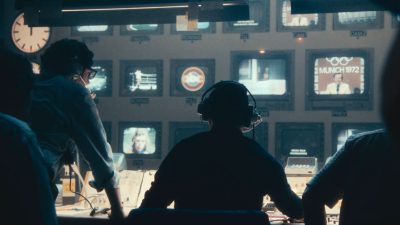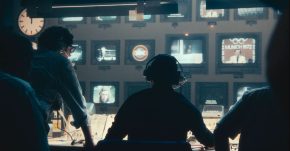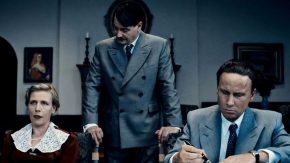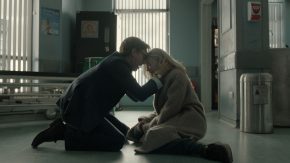What do you do when your life spirals so out of control that even London – the city of endless reinvention – feels too small to contain the newly released chaos?
If you are Rona, the protagonist of The Outrun, you go to the tiniest Scottish island, where the wind howls, the past fades away, and there are way more sheep than people. And if you are watching this film, you are about to go on a raw, haunting, wildly creative and at times very painful journey through addiction, self-destruction, and the difficult task of making peace with oneself.
Premiering at the 2024 Berlin International Film Festival, The Outrun had a frustratingly limited release across Europe and the U.S., but those lucky enough to catch it were left shaken and stirred (no pun intended). Directed by Nora Fingscheidt – whose previous films System Crasher and The Unforgivable established her as a powerhouse in character-driven storytelling – this adaptation of Amy Liptrot’s memoir is a deep dive into the murky waters of addiction and healing. And if you think you know how these stories go, think again.

Source: The Washington Post
Saoirse Ronan takes on the role of Rona with a kind of raw intensity that makes it impossible to look away. We first meet her in London, a city that has become both her playground and her prison. University life quickly dissolves into a blur of alcohol-fueled parties, unhealthy drug-fuelled relationships, and reckless decisions that leave her bruised – physically and emotionally. Her struggle with addiction trickles into every part of her life. Love? Drenched in alcohol. Friendships? Held together by vodka and awful choices. One particularly harrowing night ends in an assault, and suddenly, she has nowhere left to run.
Suddenly Rona is in rehab, taking part in group exercises, AA meetings and later: zoo trips. She suddenly feels accepted and less isolated in the company of others dealing with the same disease. However, the road of recovery is not a straightforward one.
Soon, Rona finds herself back in the stark, windswept landscapes of her childhood, on the island of Orkney. The place where everyone knows exactly who she is and what she – and her family – have gone through. If London was chaos, Orkney is silence. Rona’s mother, emotionally distant and deeply religious, offers little but gentle comfort. Her father, struggling with bipolar disorder, lives in a caravan, shifting between manic energy and immobilizing depression. Through her present and childhood experiences – flashbacks – with her family we understand more of what led her to her struggles.
Rona takes a job monitoring birds where she is surrounded by nothing but fields, cliffs and the ocean. It is the ultimate test: Can she exist without distraction? Without alcohol? Without an audience for her suffering?
Spoiler: Not right away.
One of the film’s most brutal truths is that recovery is not linear – that is what the scattered timeline of the movie introduces us to. There is no clean arc, no montage set to an uplifting indie folk song. Rona relapses. She isolates herself, drinks again, drifts in and out of painful memories. Then she gets back on her feet, gives it another strong go. But unlike in the big city, where her self-destruction blended into the background noise, here, in the vast nothingness of the wilderness, there is no hiding from it. The cinematography leans into this (Yunus Roy Imer) – wide, sweeping shots that make Rona look impossibly small, emphasizing the enormity of her inner battles, and extreme close-ups of her hand holding a cigarette, the corner of her boyfriend’s mouth and their voices engaged in playful dialogue. Love those experiential scenes, and how Fingscheidt makes her audience think, engage, and constantly pay attention to what is going on. I love the zig-zagging storytelling – although at first it is rather confusing – and the lyrical “underwater” dance scene or the beautifully edited climax about Rona’s connection with nature and through that with herself.
One of the film’s sharpest observations is how addiction, especially alcoholism, is still perceived differently when it comes to women. The Outrun does not just show the personal toll – it exposes the societal structures (or lack thereof) that make recovery so much harder.
In one AA meeting, Rona finds herself surrounded by middle-aged men, struggling to speak about her experience in a space that was not built for her. It is a jarring but accurate depiction of a reality that often goes unspoken: addiction support systems remain overwhelmingly male-dominated, despite rising rates of alcohol dependency among young women – research shows that today more 16-year-old girls have a severe problem with alcohol than boys of the same age. In Scotland, as in many places, there are still disproportionately few resources and facilities (you have heard that right!) for women struggling with addiction. The Outrun does not hammer this point home – it does not have to. The isolation Rona experiences speaks for itself. How could she openly talk to an all-men group about the abuse she had to endure?

Source: Hyde Park Picture House
You may ask yourself: is The Outrun a hopeful film? Yes, in a way. Not in the traditional sense, but in the way that acknowledges the “keep on going” as its own kind of triumph. By the time the credits roll, Rona isn’t “fixed,” but she is standing stronger than ever. She reconnects with herself, and with nature – through which she finds a deep purpose, a purpose for seaweed reservation, actually. And sometimes, a strong purpose is more than enough.
If you ever needed proof that Saoirse Ronan can do absolutely anything, this is it – she is also co-producing the project. If you ever needed a reminder that the hardest person to escape from is yourself, The Outrun will make sure you do not forget it.
And if you ever find yourself thinking about running away to a remote Scottish island to solve your problems – just know that the weather is terrible, the only store is miles and miles away, and sometimes, the only way out is through. Tipping my hat to Amy: Amy you are a true hero.
The Outrun is now available on Netflix, AppleTV, Google Play and more.
~ by Dora Endre ~



























Comments